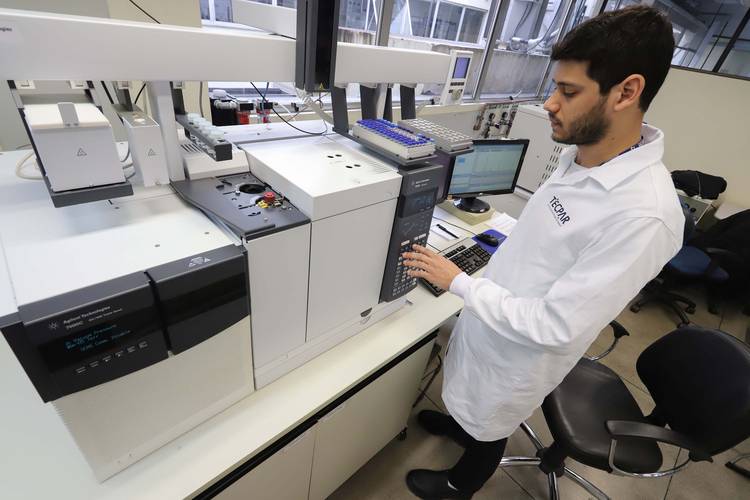Parana Institute of Technology (Tecpar) collaborates with Parana Agricultural Defense Agency (Adapar) in monitoring the correct use of agrochemicals (pesticides), fertilizers, conditioners and pollinators used in agricultural production in the state.
Inspection programs for trade and use of these agricultural inputs include sampling at the time of inspection, which is sent by Adapar to Tecpar Laboratories.
Through technological tests, the institute checks whether these products comply with the formulations declared by the manufacturers and comply with the legislation and standards of the Ministry of Agriculture and Supply (Mapa) and the National Health Surveillance Agency (Anvisa).
In the past two years, the results obtained in this work indicated a decrease in the cases of irregular use of agrochemicals in agricultural production. The percentage of approved samples increased from 77% in 2019 to 82% in 2020.
Tecpar CEO, Jorge Callado, highlights the importance of these tests for Paraná’s economy. “These tests conducted by Tecpar contribute to the use of chemical inputs in agriculture in accordance with the law, which represents savings for agribusiness, protection of rural workers and the environment and, above all, improvement of product quality,” says Jorge Called.
Carlos Pessoa, director of technology and innovation for Tecpar, the region where the institute’s technology centers laboratories are located, notes that the laboratories are Adapar’s partners in this control. He notes that “for this purpose, the state government has incorporated inspection, monitoring and guidance procedures, with the participation of various bodies and secretariats.”
analyzing – The main tests performed are agrochemical residues in agricultural products, macro and micro nutrients in fertilizers and conditioners, and the number of viable cells in vaccines. Serum is a product that contains microorganisms such as bacteria and fungi with a beneficial effect on plants.
In agricultural products, Tecpar decomposes more than 350 types of agrochemicals. In fertilizers and similar, 15 nutrients and 19 physicochemical and microbiological parameters, as well as several heavy metals, were evaluated.
“These tests are carried out according to methods recommended by Mapa and internationally recognized, which ensure compliance with relevant legislation and standards is verified,” explains Danielle Addao, Director of the Center for Health and Environmental Technology at Tecpar.
Results – Since 2016, Tecpar has analyzed 1,412 samples of agricultural products and 1,325 fertilizers, of which on average 80% were approved. Among the main agricultural products analyzed were tomatoes, strawberries, soybeans, beans and vegetables such as lettuce and watercress.
For the current contract, signed in March of this year, 426 samples of agricultural products and 410 samples of fertilizers, agricultural conditioners and pollinators are expected to be analyzed.
Correct application The use of unauthorized agrochemicals or in quantities in excess of the limit set by Anvisa brings risks to agricultural production, as well as potentially harmful effects on human health – workers and consumers – and damage to the environment.
The technical report issued by Tecpar serves as a basis for Adapar to propose corrective measures to agricultural producers and fertilizer manufacturers who do not comply with current legislation. It also provides important information to the agency for an overview of soil management practices practiced in the country’s crops.
reference – Tecpar has laboratory infrastructure and technicians specialized in technological testing related to agribusiness, being a reference in Paraná and having a prominent position in the country, complying with the most stringent international requirements for laboratories.
The institute has accreditation with Inmetro, accreditation and registration in the map and qualification with Anvisa and the Brazilian Network of Analytical Laboratories in Health (Reblas), which is the legal recognition of competence to conduct tests related to quality control and food safety.

“Wannabe internet buff. Future teen idol. Hardcore zombie guru. Gamer. Avid creator. Entrepreneur. Bacon ninja.”

